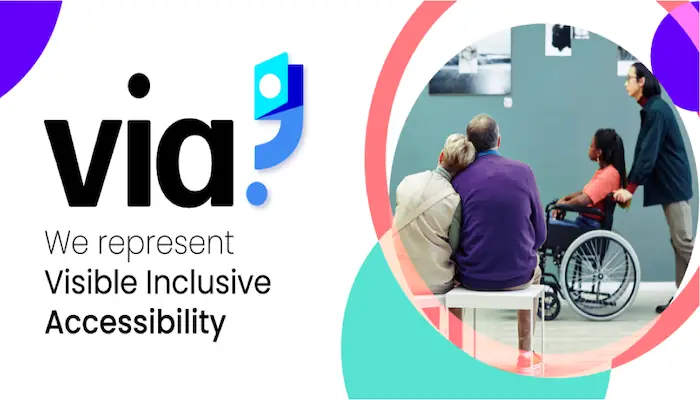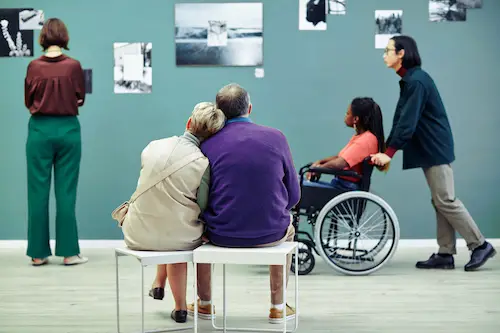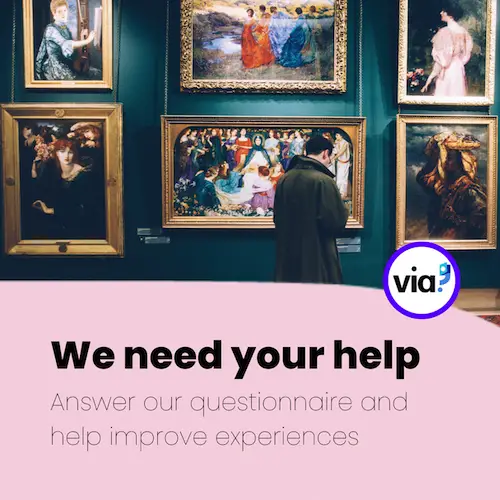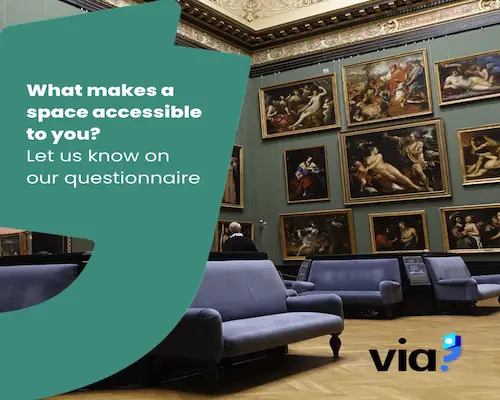
Via: representing visible inclusive accessibility across events and exhibitions
Via is working to create a standard of accessibility across the event and exhibition industry. While many access needs, disabilities or conditions aren’t visible, we believe that the adjustments, measures and efforts taken to meet people’s needs should be. Via is currently conducting research through its Visitor and Organiser Questionnaires.
Here, we meet Stephanie, the founder of Via, and share how your views and experiences can help them gain valuable insights to identify areas where improvements can be made.

Meet Steph – founder of Via
- Do you have a passion for art, music, culture, and history?
- Do you wish to visit places where you can enjoy these?
- Are there aspects of your life that make these visits more challenging, e.g. disability, age, being a parent, language barrier?
If you answered yes to these questions, then you’re in the same boat as me: I am Steph, the founder of the Via project.
Via represents visible inclusive accessibility
We are working to create a standard of accessibility across the industry. While many access needs, disabilities, or conditions aren’t visible, we believe that the adjustments, measures, and efforts taken to meet people’s needs should be.
We are currently conducting research through our Visitor and Organiser questionnaires. We are seeking your views and experiences to help us gain valuable insights to identify areas where improvements can be made.
This research will culminate in a new platform, providing access information for events/venues as well as support and guidance for event organisers. Over time, we will create a database to record the adjustments being made so that, collectively, we can collaborate across the sector.
We will celebrate successes and identify areas for development. Through sharing understanding we hope venues will be able to meet access needs more consistently and improve visitors’ experiences.

How Via started
Via began after I personally experienced repeated difficulty finding the information I needed to be able to visit a venue or attend an event. This added barrier left me exhausted and overwhelmed when trying to make plans.
I had difficulty finding the following information:
- Access information that went beyond the building’s physical access
- Information which was relevant to the event I wanted to attend not just the building itself
- Information in a format I could understand
- Information that was up to date
- Access information which considered a wider scope of what access needs were
- Sensory information
- Quiet times
- Additional information regarding rules (e.g., not being allowed to carry bags, toilets, seating etc).
The list went on…but you get the idea. And thus the cycle continued.
After opening up multiple internet browser tabs and search engine results, I would become so overwhelmed and exhausted that I would then not visit or attend the event.
The gap in aaccessible knowledge
Recent research indicated I wasn’t alone in these feelings of frustration. When planning a trip, 81% of respondents said they’d check a company’s website or search the internet for information. 73% reported having found information on a venue’s website to be misleading, confusing or inaccurate.
This can leave those already experiencing barriers to be disadvantaged and burdened with trying to find the information they require. It can also lead to the loss of potential audiences.
I realised how much this lack of information or, the difficulty I experienced with attaining it, had impacted upon my visiting events and places.
After living in a city for over 10 years, I realised how little I had seen of it despite there being many places I wanted to visit. I didn’t want this to hold me back any more. I wanted to do something about it!
Steph’s experiences
On the flip side as an artist and exhibition assistant, I have personal experience in putting on and organising events. And even with the best intentions, I would often encounter:
A desire to provide accessible experiences but I being mindful that I only have the experiences I personally have encountered, been exposed to, or that have been shared with me.
Difficulty finding accurate up-to-date advice and guidance for a method of best practice.
Difficulty finding services which have the required skills or resources to help support implementing access adjustments (eg BSL interpreters, audio descriptions, adaptive transportation.)
Reaching my personal capacity by, exceeding time, budget or reaching team/people capacity to be able to effectively carry out the tasks required to make adjustments to increase accessibility etc.
The confusion that, given the rich diversity and sheer scale of Scotland’s cultural sector, there isn’t a record of previous (and current) measures being taken to provide insights, opportunities to celebrate success and identify areas to develop further.
A desire to collectively realise an effort to work collaboratively over competitively, producing research on a currently underserved and under-researched community. Sharing insights, experiences, resources etc and all of the potential benefits increased experiences for both organisers and visitors this could result in.
All of this along with lots of support, shared insights, opinions, experiences, help and encouragement from friends, colleagues, peers, etc. lead to the beginning formation of the Via concept.
Help us!
And now we want to hear from you!
We want to know about your experiences so that we can understand your needs and how best to meet them.
So, if you can please share your insights on our questionnaires and collectively let’s help improve accessibility and improve experiences for audiences and organisers alike.
Our questionnaires
Our questionnaires are designed to gather information from both event organisers and attendees, and will take approximately 20 minutes to complete.
All responses will be anonymized, and you will have the opportunity to be entered into a draw for a £25 Amazon voucher, or to nominate a charity to receive the £25 on your behalf.
Additionally, if you would prefer to take part by interview (virtual or in person), a group meeting, phone call or by email correspondence, then please get in touch!
We have provided links to the questionnaires below, as well as an alternative viewing format for those who may find this more helpful. The questions are the same, regardless of the format you choose.

Visitor questionnaire
- Visitor Questionnaire
- Visitor Questionnaire Cards -(This link takes you to an alternative viewing format where the questions are presented one at a time, like cards, for those who may find this more useful. Please note all of the questions are the same.)
By ‘visitor’ we mean; anyone who attends an event or venue. The questionnaire is aimed at all visitors, attending a range of events or venues, this can be physical or digital/online.
Organiser questionnaire
- Organiser Questionnaire
- Organiser Questionnaire Cards – (This link takes you to an alternative viewing format where the questions are presented one at a time, like cards, for those who may find this more useful. Please note all of the questions are the same.)
By ‘organiser’ we mean: anyone who is organising or working on an activity that has visitor experiences. For example, a venue, an exhibition, a conference, a festival or otherwise. This could be online or in person, in a public space, or a private venue.
Once the questionnaires have been completed and processed, the results will be published in a document that is free to share and gain insights from. We would be happy to include you as a listed supporter/partner if you would like, and to send you a copy of the document.
Please get in touch if you would prefer to complete the questionnaire in a different format such as Easy Read or to receive a paper copy.
If you have any questions or would like more information, please do not hesitate to get in touch with us. We would be happy to chat further about the project and its goals and to discuss how you can get involved.
Thank you for your time, and we look forward to hearing from you.

For more information, follow Via on Facebook, Instagram, Twitter and LinkedIn.
By Via
More on Disability Horizons…
- Bake Off finalist Sandro Farmhouse joins the National Autistic Society as celebrity ambassador
- LanzAbility: making Lanzarote an accessible and inclusive holiday destination
- Naidex 2023: Check out accessible products and inclusive brands coming together at the Disability Horizons Marketplace
- Buckingham crutch storage accessory